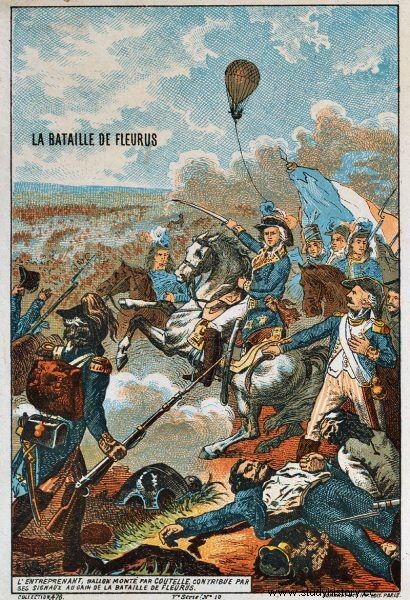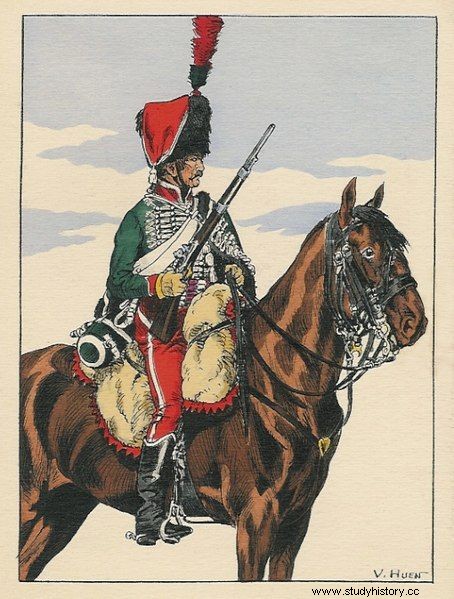Hussars - swindlers of battlefields. Arrogant to the point of pain and addicted to danger. Their courage, cleverness and unconventional actions made them legendary, but in 1795 they surpassed themselves ...
The soulless screeching of a shear guillotine in 1793 terrified the European monarchs. The anti-French coalition, established a year earlier, intensified its efforts to restore order in France and prevent the spread of revolutionary ideas. Foreign armies once again stood at the borders of France. In addition, Great Britain, which so far had been quite indifferent to the affairs of the continent, this time poured a decent penny. Albion's financial involvement allowed, inter alia, to support royalist uprisings in the French countryside.
France in the heat of war
France responded by enlisting new recruits. The decree of the National Assembly of February 1793 appointed 300,000 to arms. men. It soon turned out to be insufficient. The Public Salvation Committee therefore announced in April the general conscription of all men aged 18-25. In order to feed and equip such a large army, it had to be on a constant offensive and support itself on the enemy's territory. Initially, France suffered defeats - in Belgium, which it had to leave, and in the south and west, where royalist rebellions were rampant. By the end of the year, however, new great armies and draconian internal policies that allowed for the mass shooting of the rebels allowed the invaders to be pushed back and the rebellions to be put to rest. By the end of the year, French forces were on the attack on all fronts.
In the spring of 1794, it seemed that the coalition members would undertake a decisive counterattack. There was even a plan for a concentric attack from Belgium and the Moselle. Ultimately, however, it was abandoned and put on the defensive. Meanwhile, the French pushed the Spaniards from their borders and entered Catalonia. On the Northern Front, they defeated the Austrians at Courtrai and Tourcoing in May. And their victory at Fleurus in June meant that the Allies no longer showed a determined will to fight on this front. They gradually withdrew from Belgian territories, and in December French forces reached the borders of the Republic of the United Provinces, i.e. the Netherlands.

Battle of Fleurus
The moment to seize the country of one of the coalition partners seemed perfect. The republic has been shaken by internal struggles for some time. The party of orangeists, supporting the stadtholder line descending from the famous William of Orange, and the patriot faction fought for power. The latter, obsessed with republican ideals, would like to see the country without a governor's authority. To them, therefore, the approaching troops of revolutionary France seemed more a liberator than an invader. There was one more group - the regents, that is, the aristocratic-merchant oligarchy.
Political disputes between these three groups resulted in the fact that the invading troops of General Pichegru met with little resistance. On January 18, 1795, in Amsterdam, there was an open rebellion of patriots, as a result of which the governor William V of Orange fled to England. A day later, the French entered the city and proclaimed the establishment of the Batavian Republic, dependent on Paris. However, it was not the end of the conquest, because part of the country was still ruled by William's supporters. On the way north, General Pichegru received a report about the ships of the Dutch fleet trapped in the frozen Zuiderzee Bay. The commander of the units, Cpt. Reintjes intended to flee the port of Den Helder to join other ships previously seized by the English. Unfortunately, he set off too late and the weather also stood in the way of the implementation of the plan. The winter of this year was extremely severe and the ships were stuck in ice chains in the strait between the harbor and the island of Texel.
Hussars on Ice
The opportunity to acquire 14 ships with 850 guns on board and the accompanying team of 20 merchant ships was unique. Pichegru delegated General de Winter to this task. This Dutchman in the French service had maritime experience (in the army of the United Provinces he was a navy officer), so he seemed to be the right person in the right place. Before the night of January 22nd, French troops approached Den Helder and set up a camp. The locals reported to the French that the waters around the port were extremely shallow and that the ice was so thick that an entire cavalry regiment should successfully hold it. However, the immobilized ships were still a huge threat. The Dutch had multiple advantages in artillery that could easily wipe out de Winter's troops. So open combat was not an option. It was decided to surprise the Reintjes sailors and risk a stealthy attack on the ice. The units from the 8th Hussar Regiment and the 15th Infantry Regiment under the command of Col. Lahure - a total of approx. 2 thousand. people.

French hussar from the Napoleonic period (1804)
In the early morning of January 23, the Hussars marched in ice towards the Dutch fleet. Each cavalryman carried one walker with him, and the horse's hooves were wrapped in cloth to minimize noise. The ruse worked brilliantly. The ice withstood the onslaught of the hussars, which cannot be said of the Dutch ships. Lahure's soldiers efficiently entered the decks, and the surprised Dutch sailors did not even try to fight. Upon their arrival, General de Winter took an oath of allegiance and obedience to revolutionary France from the Reintjes crews.
So much for the dramatic version of the events written by the winners. There is a slightly more down-to-earth view of the January events in the Zuiderzee. Yes, the Dutch ships were trapped by the forces of nature and Capt. Reintjes was well aware of the impending French threat. In the evening of January 22, he watched numerous fires lit by de Winter's soldiers around the port. He wasn't going to give up without a fight though. After all, it had 850 guns and 5,000 people. Around midnight, however, he learned about the seizure of Amsterdam by the French army and the seizure of power by the patriots. In view of the pointlessness of the resistance, he handed over his ships to the French.
Whatever version you stick to, the operation at Texel ended the conquest of the Netherlands. On the other hand, the risky passage of the French hussars across the waters of the bay seemed only to confirm their assessment in the eyes of Napoleon:retreat . Even… ice.
